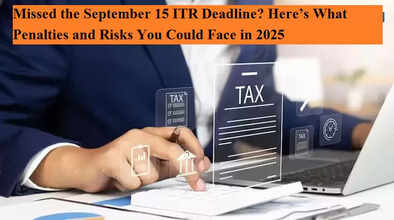Missed the September 15 ITR Deadline? Here’s What Penalties and Risks You Could Face in 2025

The deadline for filing Income Tax Returns (ITR) for the assessment year 2025–26 is set for September 15, 2025. With just days left, salaried employees, freelancers, professionals, and business owners are rushing to complete their filings. But the big question remains—what happens if you miss the deadline? Let’s break down the consequences, penalties, and risks.
Penalty for Late ITR Filing
Under Section 234F of the Income Tax Act, a penalty is imposed for late filing of returns. The amount depends on your income bracket:
-
If your total income exceeds ₹5 lakh, you will be charged a late fee of ₹5,000.
-
For taxpayers earning below ₹5 lakh, the maximum penalty is ₹1,000.
-
Those earning below the taxable limit are exempt from the penalty.
However, even if your income is below the taxable threshold, you may still need to file if you have certain income sources such as foreign earnings. Failing to do so could bring complications.
Interest on Outstanding Tax
If you have unpaid taxes and fail to file on time, an additional burden arises. According to Section 234A, interest at the rate of 1% per month (or part of a month) will be charged on the outstanding amount. This is over and above the late filing fee, further increasing your liability.
Loss of Carry-Forward Benefits
Timely filing also protects your ability to carry forward losses. If you incur losses from business, capital markets, or other sources and fail to file by the deadline, you will not be able to set off these losses against future profits. This means you lose the chance to reduce your tax liability in upcoming years, which can be a major financial setback.
Refund Delays
If excess tax has been deducted and you are eligible for a refund, late filing will delay the process. The later you file, the longer it will take for your refund to reflect in your bank account. For individuals depending on refunds for liquidity, this delay can be frustrating.
Legal Action and Jail Time in Extreme Cases
While ordinary taxpayers may only face fines and interest, the Income Tax Department does have provisions for prosecution. In cases involving deliberate tax evasion, black money, or fraudulent activity, individuals can face imprisonment ranging from 3 months to 2 years, along with fines. Though this applies mainly to high-income or fraud-related cases, it highlights the seriousness of ignoring tax compliance.
Can You File After the Deadline?
Yes, taxpayers still have the option to file a belated return until December 31, 2025. However, this comes with penalties, interest, and the loss of carry-forward benefits. Unlike in past years, the government has shown little intention of extending the deadline unless major technical glitches occur on the income tax portal.
Bottom Line
Filing your ITR on time is not just about avoiding penalties—it also protects your ability to claim refunds, carry forward losses, and stay compliant with tax laws. With the September 15 deadline fast approaching, taxpayers are strongly advised to complete the process without delay to avoid unnecessary financial and legal troubles.

